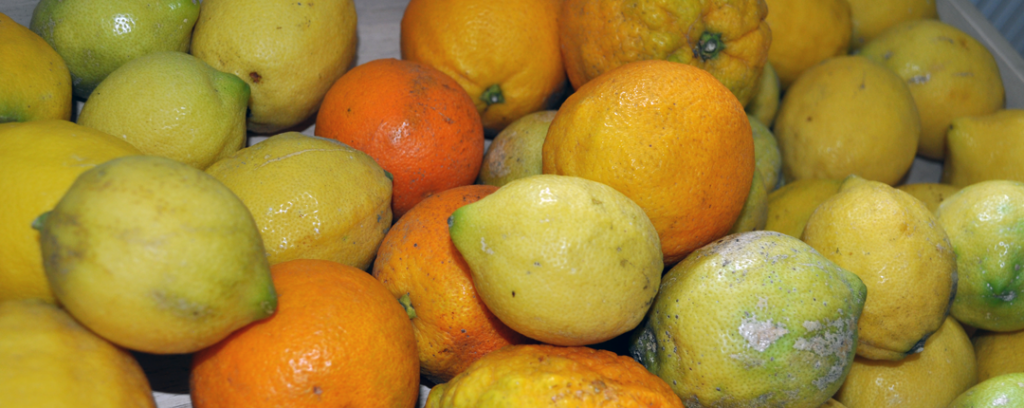
Everybody knows that lemons are sour. One of the reasons for this is the high vitamin C content: a lemon contains around 50 mg of it, which is half of the total daily requirement for an adult. The yellow fruits also provide the valuable mineral potassium. This is involved in the water balance of the body and fulfills important functions in the heart, nerves and muscles.
Lemon Nutritional Values
– Calorie content about 39 kcal (162 kJ).
– Protein: 0.7
– Fat: 0.6
– Carbohydrates: 3.16 (glucose: 1.4, fructose: 1.35, sucrose: 0.41)
– Water: 88.8
– Dietary fiber: 1.3
– Carbohydrate exchange unit: 0.3
Storage
In a cool room – for example in the cellar – fresh lemons can be kept for several weeks, at room temperature they dry out faster. You can also keep lemons in the vegetable drawer of the fridge, but they lose some of their essential oils and their fragrance. If you want to store lemons longer, you have to be careful to sort out fruit that has become moldy from time to time.
Storage of Essential Oils
Small quantities are often filled in glass bottles – larger quantities are mainly shipped in plastic containers. Normally, essential oils can dissolve plastic – so special materials are required for this purpose. However, even with suitable canisters, the essential oils should not remain in the plastic container for a long period of time, otherwise some components will diffuse, perhaps even dissolve components of the container – and after a while you will find a retracted canister.
Durability is not an easy topic. Some oils are very sensitive, others need oxygen for their „ripening“ and smell/taste very unpleasant without this. Some oils even get better the older they get. Citrus oils spoil (e.g. smell stale to „burnt“, burn on the skin) through the oxidation process, i.e. the reaction of the oil with oxygen. Oxidation occurs more in a small quantity of oil relative to a large container (which of course then has a lot of oxygen in it) than in a container filled to the brim with oil with little room for oxygen. For better durability and to protect against oxidation, the essential oils can be covered with a layer of argon during bottling. This is a naturally occurring inert gas that prevents the oils from reacting with oxygen. The recommendation for storage temperature is between 2 and 22 degrees. In general, a cooler temperature reduces „responsiveness“. I myself store my citrus oils in the fridge at 4-6 degrees. In comparison, the durability there is clearly better than that of oils stored at room temperature – which may also be due to the constant temperature. Avoiding heat and strong sunlight is good for every essential oil.
Use of Lemons
“A glass of lemon water in the morning works wonders and stimulate the metabolism”: If you drink a large glass of water first thing in the morning, you are doing something good for your body, because we lose a lot of water over night. It also gently wakes the digestive tract from sleep. It is best when the water is lukewarm.
Lemons:
-stimulate the immune system
- keep „fit“:
The juice of a lemon provides plenty of calcium, potassium and magnesium, which are essential for the healthy functioning of nerves, heart and muscles.
- protect the body cells:
There are many flavonoids in lemons. These secondary plant substances have an antioxidant effect, i.e. they absorb free radicals in the body before they can damage the body’s cells.
- support wound healing:
The vitamin C, or ascorbic acid, of the yellow fruit helps wounds such as cuts or abrasions heal faster. In addition, ascorbic acid also plays an important role in healthy and strong bones.
- bring the acid-base matabolism into balance:
It sounds paradoxical, but it’s a fact: they have a detoxifying effect. They increase the pH value in the body and bring the acid-base balance into balance.
- give firm skin:
Smooth and firm skin as well as strong connective tissue – lemons can also fulfill this dream, the vitamin C contained can be used by the body to produce collagen.
- relieve indigestion:
The acids in lemons can improve gas, bloating or diarrhea. A glass of water with lemon is ideal here.
- Lemon (ess.) oil can also be used against warts, but it takes a long time for them to dry out and fall off. (Lemon myrtle is also very suitable for molluscs in children).
- Not everyone likes every scent. On the contrary – some smells can even trigger nausea – or unpleasant feelings.This aversion hardly ever occurs with the scent of lemon and is therefore versatile.
- Lemon juice and lemon oil are good hair conditioners
- Lemon oil (in the meantime rather lemon scent – s.Citral) is the most well-known household scent, it is in many detergents, cleaning agents
- Its fresh lemony scent goes well with all soaps and in every household.
For toilets or storage rooms, and as an additive in cleaning water, in the washing machine or dishwasher.
- In combination with lavender oil, it is a good travel companion as a disinfectant and for refreshing in between.
- It can be used as a chewing gum solvent.
Carbon Footprint:
With an emission value of less than 130 grams per 100 grams, lemons have a good CO2 balance. The CO2 values are based on the calculations of the IFEU Institute for Energy and Environmental Research in Heidelberg and were individually balanced for each food as „average food“ as it is sold in Germany. They take into account the place of production, the production method, all associated transport, processing, packaging and storage proportionally. The emissions of all greenhouse gases such as e.g. Carbon dioxide (CO2), methane (CH4) and nitrous oxide (N2O) were taken into account and converted into CO2 equivalents. Simplified, however, only CO2 is spoken of.


Recent Comments